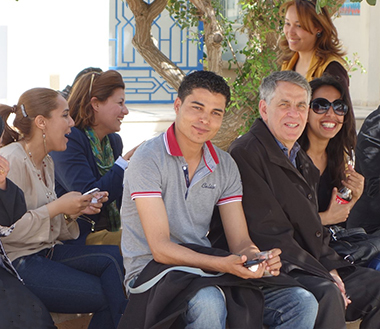Armao and Bass Teach Investigative Reporting Skills in Tunisia
 |
|
Professor Thomas Bass, fourth from left, with students in Tunisia from a previous trip. |
ALBANY, N.Y. (February 23, 2016) – Professors Rosemary Armao and Thomas Bass will lead workshops in investigative reporting in Tunisia this summer, where they are helping to develop a Center for Investigative Reporting.
“Rosemary and I have been working on journalism development in Tunisia since 2013,” said Bass. “We helped train young journalists at the University of Tunis, and now we are working with journalists who are poised to make serious contributions as investigative reporters. These reporters are crucial for a country struggling to develop democratic institutions and a free press. Tunisia was the spark for the Arab Spring, and it remains a beacon in the Arab world for progressive values and aspirations.”
Bass, who is leading the project, is a professor of English and journalism. Armao is director of the Journalism Program at UAlbany. The third co-principal investigator on the project is Jonathan Murphy, consultant to the United Nations Development Programme and professor of international management at the University of Cardiff. All three have extensive experience working in international media development.
Since the Jasmine Revolution of 2011, Tunisia has painstakingly built the framework for democratic governance and a free society. The country’s progress has been marked by the adoption of a democratic constitution and free parliamentary and presidential elections in 2014 — accomplishments that were recognized by awarding Tunisia the 2015 Nobel Peace Prize. This process, fraught with crises and conflicts, has been sustained by substantial media and citizen pressure, and a new $60,000 National Endowment for Democracy (NED) grant to Armao and Bass is meant to help sustain this forward motion.
NED is a nonpartisan grant-making foundation, founded by Congress in 1983 to promote democracy and strengthen democratic institutions around the world. Supporting groups working in more than 90 countries, the endowment’s nongovernmental status allows it to respond quickly when there is an opportunity for political change. NED is dedicated to fostering the growth of democratic institutions abroad, including a vibrant civil society that ensures human rights, an independent media, and the rule of law.
“There is little we do as journalists or professors as important as this work in emerging democracies,” said Armao. “We are helping to ensure that verification and accuracy, keeping tabs on authorities, and the right to access information become standard practice in parts of the world where these practices are new. This works makes us even more passionate when teaching these skills to our students at UAlbany.”
![]() For more news, subscribe to UAlbany's RSS headline feeds
For more news, subscribe to UAlbany's RSS headline feeds
A comprehensive public research university, the University at Albany-SUNY offers more than 120 undergraduate majors and minors and 125 master's, doctoral and graduate certificate programs. UAlbany is a leader among all New York State colleges and universities in such diverse fields as atmospheric and environmental sciences, business, education, public health,health sciences, criminal justice, emergency preparedness, engineering and applied sciences, informatics, public administration, social welfare and sociology, taught by an extensive roster of faculty experts. It also offers expanded academic and research opportunities for students through an affiliation with Albany Law School. With a curriculum enhanced by 600 study-abroad opportunities, UAlbany launches great careers.


